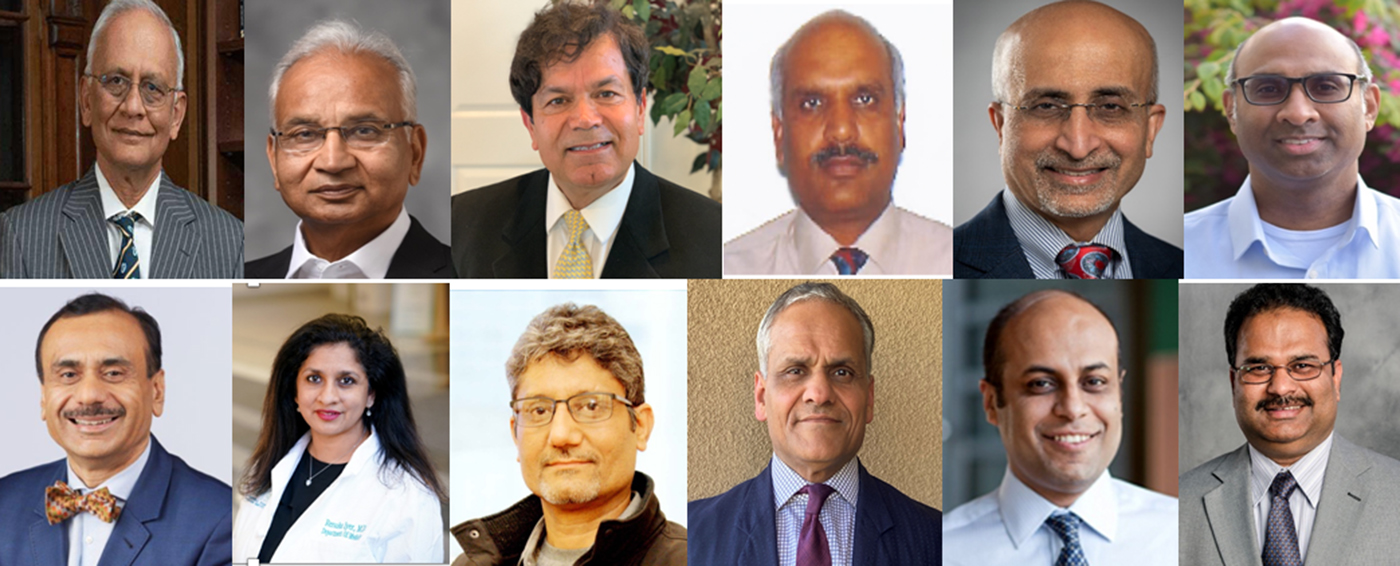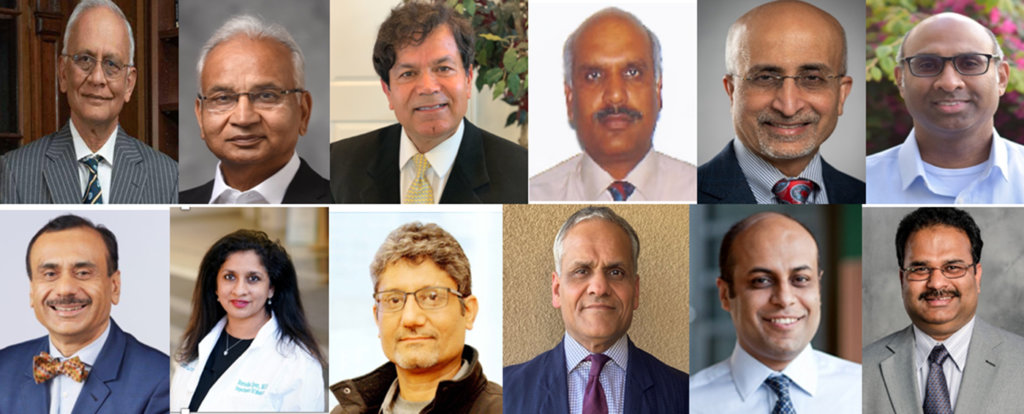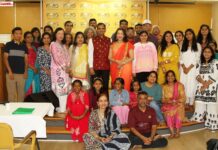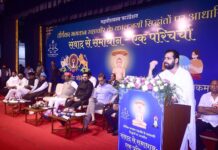
India Post News Service
The Society of American Asian Scientists in Cancer Research (SAASCR) is a non-profit, non-political organization registered in the state of California in 2004 and has more than 5000 members. All our members are also members of American Association for Cancer Research. SAASCR scientists are from Asia, mainly of Indian origin, and working in the U.S. and Canada in the field of cancer research and fully sponsored by the biotechnology company.
Dr. Rajvir Dahiya, the president of SAASCR, presented awards to these scientists on April 10th, 2022 during American Association for Cancer Research Annual Meeting held at New Orleans April 8-13th 2022. Dr. Rajvir Dahiya is a Professor Emeritus at the University of California San Francisco (UCSF) School of Medicine. Dr. Dharam Paul Chauhan is a secretary of SAASCR.
Mani Menon, M.D.
Dr. Mani Menon is a pioneering cancer surgeon whose body of work has helped to lay the foundation for modern robotic surgery. He serves as Chief of Strategy and Innovation in the Department of Urology for the Mount Sinai Health System. He also serves as a Professor of Urology, Director of Education and Director of the Precision Prostatectomy Program in the Department of Urology at Icahn Mount Sinai and Center of Excellence for Prostate Cancer at The Tisch Cancer Institute. Dr. Menon has personally performed more than 6,000 robotic prostatectomy surgeries and is considered to be one of the foremost surgical innovators in the world. Dr. Menon is a recipient of several awards such as the Gold Cystoscope award of the American Urological Association; the Dr. B.C. Roy Award from the President of India, which is the highest award given by the Government of India for achievements in medical science; the Hugh Hampton Young Award; the Keyes Medal, recognized as the greatest individual citation awarded by the American Association of Genitourinary Surgeons; and the St. Paul’s Medal from the British Association of Urological Surgeons. He has been a visiting professor at more than 50 institutions across the globe, where he has lectured, performed robotic surgery, and trained hundreds of surgeons. Dr. Menon’s team has been involved in the establishment of more than 35 robotic surgery programs in Europe, Asia, and the Americas.
Dr. Menon has published more than 1,000 manuscripts, book chapters, and abstracts, primarily in the field of robotic surgery, kidney transplantation, and urolithiasis. His work has appeared in the major urological journals as well as in the Journal of Clinical Investigation, the Journal of Biological Chemistry, the American Journal of Physiology, Proceedings of the National Academy of Sciences, and The New England Journal of Medicine. He is a member of the American Association of Genitourinary Surgeons, and the Society of Scholars at Johns Hopkins University, his alma mater. He is an honorary member of both the American Urological Association and the European Association of Urology, a recognition reserved for their most distinguished members.
Dr. Menon graduated from JIPMER in Pondicherry, India, and completed his residency at the Brady Urological Institute at The Johns Hopkins Hospital. He served on the faculty at Washington University in St. Louis from 1980 to 1983, when was appointed Founding Chair and Professor of the Division of Urological and Transplantation Surgery at the University of Massachusetts Medical School. In 1997, Dr. Menon became Chair of the Department of Urology at Henry Ford Hospital and in 2000, was appointed the first Director of the Vattikuti Urology Institute, of which he is now Director Emeritus.
After earning his medical degree from the Jawaharlal Institute of Postgraduate Medical Education and Research (JIPMER) in India, he completed his residency in urology from the Brady Urological Institute at Johns Hopkins in 1980. As a resident, he helped his mentor, Dr. Patrick Walsh, develop a technique that allowed measurement of androgen receptors in the human prostate for the first time. Dr. Menon has subsequently pioneered robotic surgery techniques that have revolutionized the field of urological oncology and laid the framework for extending robotics to other surgical disciplines, influencing the surgical care of millions of patients worldwide. His work has been credited with establishing the da Vinci surgical platform across many branches of surgery. In June 2017, an exhibit titled Many Voices, One Nation at the Smithsonian National Museum of American History incorporates some of Dr. Menon’s personal effects.
Mahendra Bhandari, MBBS, M.S., M.Ch., M.B.A., D.Sc. (Hon)
Dr. Mahendra Bhandari is the CEO of the Vattikuti Foundation, a non-profit organization that enables application of cutting-edge technologies with surgical innovation and surgeon education to improve patient outcomes. The Foundation takes pride in sourcing robotic technology developed in United States and then disseminating it across the globe, with special preference given to institutions and surgeons in India. In congruence with the mission of the Foundation, Dr. Bhandari combines his domain knowledge, business acumen and long track record of surgical innovation to evaluate new technologies at an early stage and helps them derive benefits from high patient volumes and surgical skills in India to make them cost- effective.
He is also responsible for the assiduous mapping and coordination of research and neoteric techniques for further advancements in robotic surgery. As a medical educationist, he mentors fellow surgeons and a frequent keynote speaker at the international meetings and educational institutions all over India. His rich academic experience in India and the United States make him uniquely qualified to lead the mission of the Foundation. For his efforts to bring robotic surgical programs to India, he has been one of the two medical professionals to be recognized at the Smithsonian Museum of American History in Washington DC under the “Many Voices One Nation” section, recognizing 500 years of the history of immigrants in India. The exhibit displays his O1 visa granted under EB1 (Extraordinary Brilliant) category.
The perceptiveness and erudition that Dr. Bhandari carries as a kidney transplant surgeon, medical educationist, innovator, and healthcare administrator can be ascribed to the top-notch education that he has received. He is an alumnus of some of the most renowned medical schools and universities around the globe having acquired his MBBS from SMS Medical College, Jaipur, and his M. Ch in Urology is from CMC Vellore. His role as a medical administrator and business thought-leader have demonstrated his educational credentials, which include an Executive MBA from the University of Michigan and a graduate degree in Biostatistics from the Harvard Extension School.
Dr. Bhandari has accrued experience in diverse roles throughout the healthcare industry. He has held noteworthy positions in his career with reputed institutions. He was a Founder and Vice Chancellor of Medvarsity, Director of Sanjay Gandhi Postgraduate Institute of Medical Sciences (SGPGI) Lucknow (for two terms) and first regular Vice Chancellor of King George Medical University (KGMU), an institution with the history of 100 years. As a pioneer and spearhead for the inclusion of sophisticated technologies in the world of medical sciences, Dr. Bhandari has been conferred with many honorary awards. He has received the Dr. B.C. Roy Award for the year 1996, the Padma Shri (2000) by the Government of India; and the President Award for 2014, by the Indian American Urological Association. He has 300+ publications in high impact journals and has contributed several book chapters, edited specialty books as guest editor. He founded the Indian Journal of Urology and has served on the boards to several prestigious journals including British Journal of Urology International.
Badrinath R. Konety, M.D., M.B.A.
Dr. Badrinath R. Konety, MD, MBA, FACS is currently serving as the President, Allina Health Cancer Institute, Minneapolis and Chief System Research Officer for Allina Health. He is a Professor in the department of Urology at Rush Medical College and an Adjunct Professor of Urology at the University of Minnesota. He has recently served as The Henry P. Russe, MD, Dean of Rush University Medical College and Senior Vice President for Clinical Affairs, Rush University System for Health.
Dr. Konety was previously the Associate Dean for Innovation and Director of the Institute for Prostate and Urologic Cancers at the University of Minnesota Medical School. A distinguished professor, Dr. Konety also held the Dougherty Family Chair in Uro-Oncology. He had multiple leadership positions during his tenure at the University of Minnesota. He was Chair of the Department of Urology for more than a decade, Associate Director for Clinical Affairs at the Masonic Cancer Center and Chair of the Oncology Service Line Steering committee and also served as Chair of the Finance Committee, the Chief Executive Officer University of Minnesota Physicians and Chief Clinical Officer for MHealth Fairview.
Dr. Konety completed his residency, MBA and American Foundation for Urologic Disease Research Scholar fellowship at the University of Pittsburgh. He completed his urologic oncology fellowship at Memorial Sloan Kettering Cancer Center. An accomplished clinician, researcher and scholar, Dr. Konety has authored or co-authored over 300 peer reviewed publications, numerous book chapters and edited two books. He has been and is principal or co-investigator on grants funded through the Department of Defense, National Institutes of Health, American Geriatrics Society, and Center for Disease Control.
Dr. Konety’s research work has focused on both basic science and outcomes/health services research. He has worked on developing new strategies for gene therapy using Ad5PSA and Ad5Trail for advanced prostate cancer with studies being translated from the lab to phase I clinical trials. He has also been involved in preclinical studies of novel chemotherapeutic agents (lupeol) for the prevention as well as inhibition of prostate cancer growth. He continues to work with collaborators on new markers for aggressive prostate cancer such as ROBO1 and S100A4. He has also been involved in developing new markers for bladder cancer. He has also led projects that focus on outcomes, cost effectiveness and quality of life in patients with bladder and prostate cancer. He has been the co lead and co-founder of CHAAMPS, which is a national center conducting research on African American Men’s Health. He is also a collaborative investigator on RESTORE, a series of NIH funded studies on prostate cancer in sexual minority men.
Dr. Konety is an active member of numerous professional medical societies including the American Urological Association, the American College of Surgeons, SocieteInternationaleD’Urologie (SIU) and the American Association of Genitourinary Surgeons. He is the former President of the SIU, the Society of Academic Urology and the Minnesota Urologic Society. He has been the Associate Editor of the Journal of Urology. He is also a member of several other editorial boards and the executive leadership of several societies. He has received the Jahnigen Career Development Scholar Award (American Geriatric Society), the Ferdinand Valentine fellowship (New York Academy of Medicine) the David Utz award (Minnesota Urologic Society) and the Felix Guyon Medal (SIU). He has trained and mentored scores of students, residents and fellows.
Ravindra Majeti, M.D., Ph.D.
Dr. Ravindra Majeti MD, PhD is the RZ Cao Professor of Medicine, Chief of the Division of Hematology, and Member of the Institute for Stem Cell Biology and Regenerative Medicine at the Stanford University School of Medicine. He was born and raised in Cincinnati, Ohio to parents originally from Andhra Pradesh. He was an undergraduate at Harvard, earned his MD and PhD from UCSF, and trained in Internal Medicine at Brigham and Women’s Hospital in Boston. Dr. Majeti completed his Hematology Fellowship at Stanford and is a board-certified hematologist. While at Stanford, he completed post-doctoral training in the laboratory of Irving Weissman, where he investigated acute myeloid leukemia (AML) stem cells and therapeutic targeting with anti-CD47 antibodies. With Dr. Weissman, he developed a humanized anti-CD47 antibody, initiated first-in-human clinical trials, and in 2015, co-founded a biotech start-up Forty Seven Inc. Forty Seven Inc., along with the lead anti-CD47 antibody magrolimab, was acquired by Gilead in 2020.
Dr. Majeti directs an active NIH-funded laboratory that focuses on the molecular characterization and therapeutic targeting of leukemia stem cells in human hematologic disorders, particularly AML, and has published >100 peer-reviewed articles. Ongoing work in the lab covers a diverse range of topics and includes studies of stem cells, pre-leukemia, epigenetics, genomics, genome editing, cancer systems biology, synthetic lethality, small molecule drug development, immunotherapy, CAR-T cells, cancer vaccination, and RNA-based gene therapy. Diseases investigated include pre-leukemic/clonal hematopoiesis, adult and pediatric AML, MDS, and ALL. He is a recipient of the Burroughs Wellcome Career Award for Medical Scientists, the New York Stem Cell Foundation Robertson Investigator Award, and the Leukemia and Lymphoma Society Scholar Award. Dr. Majeti is a member of the Committee on Scientific Affairs for the American Society of Hematology (ASH) and the American Association for Cancer Research (AACR) Task Force on Hematologic Malignancies. He also serves on the editorial boards of Blood, Cell Stem Cell, and Cancer Discovery Journals.
Ashutosh Tewari, M.D., M.Ch.
Dr. Ashutosh Tewari is a Professor and the System Chair of the Milton and Carroll Petrie Department of Urology at the Icahn School of Medicine at Mount Sinai, an integral component of the Mount Sinai Health System, which includes seven New York Hospitals. In addition, he is the Director of the Center of Excellence for Prostate Cancer at the Tisch Cancer Institute, Director of The Lizzie and Jonathan Tisch Center for Prostate Health, and Director of the Robert F. Smith Prostate Cancer Disparity Program. He also serves as a Tisch Cancer Institute and Institute of Immunology member at Mount Sinai. Dr. Tewari began his two-year term as President of the Society for Urologic Robotic Surgeons (SURS) on August 31st, 2020.
Since 2013, the Department of Urology has undergone significant expansion under the leadership and vision of Dr. Tewari. Today, it provides state-of-the-art services for diagnosing, treating, preventing, and managing a wide variety of urologic conditions, including genitourinary cancers. Among his other significant achievements is the recruitment of basic scientists, surgeon-scientists in kidney cancer, bladder cancer, kidney stones, endourology, and the recruitment of new medical directors for Interventional Urology, Focal Therapy program, and Men’s Health programs.
Dr. Tewari has been a pioneer in Robotic Surgery and has been involved in developing Robotic Prostatectomy from its inception. He has made a significant impact on the anatomical foundations as they apply to Robotic platforms and has performed over 7,500 robotic prostatectomies in his career. Dr. Tewari has also made seminal contributions to prostate cancer research and has several research grants. Dr. Tewari is one of only a few robotic surgeons to be awarded research grants from the National Institutes of Health (NIH) and the Department of Defense (DOD), including an R01 grant for which he serves as the Principal Investigator, researching the utility of multiphoton microscopy during prostate cancer treatment. In addition, he is a clinician-scientist who has incorporated the use of molecular diagnostic tools like Oncotype Dx, Decipher, Prolaris, Precision medicine, Sema-4, and Foundation One for risk stratification and decision support.
Dr. Tewari has made seminal contributions to prostate cancer research. Over the past several years, he has studied various aspects of prostate cancer, including surgical prostate anatomy, genetic risk profiling, epidemiology, racial disparities, risk modeling, and survivorship issues. Dr. Tewari leads a multidisciplinary team of basic and clinician-scientists with a key focus on immunotherapy clinical trials, studies on racial disparity of cancer, radio-genomics and functional genomics of tumors; inter- and intra-tumor heterogeneity, drug resistance, tumor-microenvironment and immune adaptation, epigenetics, viral vectors for gene therapy, neo-antigen and biomarker discovery platforms for GU cancers. He has also contributed to the understanding of MRI based imaging and racial disparities in prostratecancer. Academically, Dr. Tewari is recognized as a world-renowned expert on urologic oncology with over 250 peer reviewed published papers to his credit; he is on such lists as America’s Top Doctors, New York Magazine’s Best Doctors, and Who’s Who in the World. In 2012, he was presented with the American Urological Association Gold Cystoscope Award for “outstanding contributions to the field of urologic oncology, most notably the treatment of prostate cancer and the development of novel techniques to improve the outcomes of robotic prostatectomy.” In his free time, Dr. Tewari enjoys spending time outdoors, going on long hikes, and spending time with his family.
Renuka V Iyer, M.D.
Dr. Renuka Iyer MD is Professor of Oncology at Roswell Park Comprehensive Cancer Center, Buffalo, NY where she focuses on multidisciplinary care and clinical research of patients with gastrointestinal cancers with special focus on NETs. She got her medical degree from Grant Medical College, University of Bombay, India, Internal medicine residency at Lincoln Medical Center and Cornell Weill School of Medicine, NY and Fellowship in Medical Oncology at Roswell Park, Buffalo before joining the GI Medical Oncology Division as faculty at Roswell Park in 2004. She is the Section Chief of The GI Medical Oncology Division, Vice Chair of Faculty Recruitment & Retention, and Co-Leader of the Liver and Pancreas Tumor Program. She also serves on the NCCN and ASCO Hepatobiliary cancer treatment guidelines panels and has held several leadership positions in national organizations and grant review panels. She is actively involved in education and novel clinical trials, research, and awareness in neuroendocrine cancer.
Beginning her career as a post doc in the laboratory of Dr. JD Chapman at Fox Chase Cancer center she learnt basic laboratory research skills as well as the importance of mentorship and paying it forward. During her fellowship at Roswell Park, her mentor Dr. Candace Johnson who is the first woman CEO served a great role model. In her own journey as a woman leader, she has found that working hard, taking on responsibility, good time management and asking for help are key to success and work life balance especially for women. She is a physician scientist with a focus on translational research, clinical trials with non-invasive biomarkers and is grateful to many granting agencies especially the American Cancer Society and her collaborators for supporting her research work.
She has built several strong relationships both within and outside the institute that allowed her to complete and report many phase ½ trials and along the way also encourage and support several young trainees. The highlight of her career has been her work with Dr. Bud Tennant, a veterinarian who discovered the woodchuck model of hepatitis B related hepatocellular cancer, which has now moved from Cornell University to Roswell Park and continues to bring collaborators and industry partners to Roswell for both antiviral and antitumor research. The relationships built during her academic endeavors as well as her family and friends in India and the US who have been incredibly supportive have made this a fulfilling and rewarding journey.
Girish C Shukla, Ph.D.
Dr. Girish Shukla is a Professor of Cancer Biology at the Center for Gene Regulation in Health and Disease. He is a member of the Experimental Therapeutic program of the CASE Comprehensive Cancer Center and adjunct faculty of the Cancer Biology of the Learner Research Institute of the Cleveland Clinic Foundation. Dr. Shukla is an internationally recognized expert in the nuclear pre-mRNA splicing of the minor class introns and regulation of the Androgen Receptor mRNA metabolism. For the first time, his research led to the seminal discovery that the Androgen Receptor, a holy grail of Prostate Cancer therapy, is controlled by multiple microRNAs, which laid the foundation for the miRNA-based Androgen Deprivation therapeutics.
Dr. Girish Shukla received his Bachelor’s and the Master of Science degrees in India. Subsequently, he worked for the United Nations Industrial Development Organization and World Bank-supported institutes. He moved to a World Bank Institute to work on the parasitic disease of the cattle on the East Coast of Africa, known as the International Livestock Research Institute, Nairobi, Kenya.
Dr. Shukla received his Ph.D. in Biochemistry and Molecular Biology from Brunel University. In 1997 he worked in the Lerner Research Institute of the Cleveland Clinic Foundation, a number one hospital and research institute in cardiovascular diseases globally for the last 27 years. As a research associate scientist, he cloned and characterized numerous RNA:RNA interactions of the minor spliceosome. His work was the first to demonstrate the conservation of the minor spliceosome between plants and humans for nearly 1 billion years of evolution.
He continued his RNA and Cancer Biology research at the Center for Gene Regulation of Health and Disease at the Cleveland State University and has published in high-impact journals, including Molecular Cell, Proceeding of the National Academy of Sciences, Nature Genetics, Nucleic Acids Research, Cancer Research, RNA, and many more. His current research mainly focuses on the Post-transcriptional control of cholesterol and Testosterone biosynthesis in human tissues. Dr. Shukla has received various awards, including World Bank, RNA Society, National Science Foundation fellowships, and outstanding awards from Cleveland State University. His trainees are successfully working in academics and the biotechnology industry globally. In addition, he continues to volunteer to assist junior faculty and numerous students in the USA and India in research and academic avenues.
Sharad S Singhal, Ph.D.
Dr. Sharad Singhal is a Professor of Medical Oncology and Therapeutics Research at Beckman Research Institute of City of Hope, and an affiliate full member of City of Hope Comprehensive Cancer Center and Developmental Cancer Therapeutics at City of Hope, Duarte, CA.
Dr. Singhal received his B.Sc. in Biology (1982) and M.Sc. in Chemistry (1984) from Agra University, India, and his PhD in Biochemistry (1989) from Central Drug Research Institute (CDRI), Lucknow, India. He received Council of Scientific and Industrial Research (CSIR) fellowship during his PhD. He did his post-doctoral training at the University of Texas Medical Branch (UTMB) at Galveston, TX (1989 – 1993). His research interests are in glutathione metabolism and its role in stress-defense, carcinogenesis, drug-resistance, radiation-resistance, and cell-signaling mechanisms.
At City of Hope, Dr. Singhal has conducted carcinogenesis studies in multiple cancers, which add to his collective expertise in cancer prevention and control research. The focus of his current research is the development of natural compounds that broadly target cancer-specific signaling networks into the next generation of cancer preventive and therapeutic drugs that have the advantageous side-effect of lowering insulin-resistance. He has successfully employed a highly effective in-silico signaling model based on the mercapturic acid pathway, which has already yielded three novel natural source lead-compounds with very high efficacy in tumors of prostate, breast, renal, and neuroblastoma.
In addition to cancer prevention and carcinogenesis studies, his lab is also focus on multi-drug resistance in cancer and the role of non-ABC drug transporter (RLIP/RalBP1) in tumor progression. Loss of p53, perhaps the most powerful tumor suppressor gene, predisposes rodents to spontaneous cancer and humans to familial, as well as acquired, cancers. In solid cancers, RLIP levels are significantly higher in tumor cells than in surrounding normal cells.
Homozygous RLIP knockout (RLIP-/-) mice have no spontaneous malignancies and are highly resistant to carcinogen-induced malignancies, however, homozygous p53 knockout (p53-/-) mice are highly susceptible, developing spontaneous malignancies by ~6 months of age and carcinogen-induced malignancies much earlier than wild-type mice. Until recently, no oncogenes had been identified that, when knocked down, could abrogate spontaneous carcinogenesis in p53-/- rodent models. However, recently we reported the astounding observation that p53-/- mice were significantly protected from spontaneous malignancy for up to eight months of age by the partial depletion of RLIP (an oncoprotein overexpressed in cancer cells) via antisense therapy.
This protection was associated with nearly complete reversal of the major epigenetic and associated gene expression changes that normally occur in p53-/- mice. RLIP-/- and p53-/- mice are polar opposites in the spectrum of cancer susceptibility (Awasthi S et al., PNAS 2018; Singhal J et al., Cancer Lett. 2018, 2019; Nagaprashantha L et al., J Proteomics 2019; Krishna BM et al., Cancers 2020; Singhal J et al., Mol Carcinogenesis 2021; Carcinogenesis 2021). These studies demonstrate that depleting or inhibiting RLIP is a novel and highly strategic targeted therapy for treatment of cancer and indicate that RLIP is a high-value target for cancer therapy and provide sound mechanistic and pre-clinical rationale for its clinical development. In summary, Dr. Singhal has attracted multiple federal and foundation grants and has authored over 200 publications.
Amit K Verma, M.D.
Dr. Amit Verma is the Director, Division of Hematology-Oncology, Professor of Medicine and Oncology, Albert Einstein College of Medicine and Montefiore Medical Center. Dr. Verma did his MBBS from All India Institute of Medical Sciences in 1995, residency in Internal Medicine from the University of Illinois College of Medicine at Chicago (1996-1999). He did his fellowship in Hematology and Medical Oncology from the McGaw Medical Center of Northwestern University in 2003.
His lab has been involved in study of pathogenesis of blood cancers. His work has shown that certain signaling pathway (p38 MAP kinase, TGF-beta, smad2/3, IRAK and others) is activated in leukemias and pre-leukemias and this work has directly led to clinical trials with drugs targeting these pathways. He has also shown that increased risk of blood cancer mutations is seen in 911 WTC first responders. He has also worked on studies on the effects of COVID in patients with blood cancers. His research work has been funded by NIH, DOD and Leukemia and Lymphoma Society.
Manoj K Mishra, Ph.D.
Dr. Manoj Mishra is serving as professor of Biology and the founding director of Cancer Biology Research and Training and Freshmen Biology Programs at Alabama State University. Additionally, Dr. Mishra holds an adjunct appointment at the Division of Molecular and Cellular Pathology within the Department of Pathology, School of Medicine at the University of Alabama Birmingham, Birmingham, AL.
Dr. Mishra received his M.Sc. and Ph.D. degrees from Banaras Hindu University, Varanasi, India. After obtaining his doctorate, he moved to the USA and did his postdoctoral training in the Division of Biology, Kansas State University, Manhattan, KS; Division of Allergy and Immunology, Department of Pediatrics, Washington University School of Medicine, St. Louis, MO; and Division of Rheumatology, Department of Pediatrics at Medical College of Wisconsin, Milwaukee, WI. Before moving to Alabama State University in early 2009, Dr. Mishra continued at Medical College of Wisconsin as a Research Scientist in the Division of Allergy and Clinical Immunology within the Department of Pediatrics. Dr. Mishra serves on several NIH study sections and the editorial board of scientific peer-reviewed journals. Dr. Mishra’s work is currently supported by research and educational grants from the National Institutes of Health and the National Science Foundation. Dr. Mishra has several awards and recognition for his teaching and research. In 2015, he received the faculty of the year award at Alabama State University, and in 2013, he was selected among the top 25 professors among mid-sized universities in the USA.
Dr. Mishra’s research interest focuses on broader areas of immunology and tumor biology. Currently, Dr. Mishra’s lab investigates the roles of dietary compounds, microbial metabolites, and immune cells, especially regulatory T cells and NK cells, in prostate cancer development and progression. Dr. Mishra’s lab also focuses on prostate cancer health disparity, especially in the blackbelt of Alabama.

Lower panel (left to right) Dr. Ashutosh Tewari, Dr. Renuka V Iyer, Dr. Girish C Shukla, Dr. Sharad S Singla, Dr. Amit K Verma, and Dr. Manoj K Mishra.






